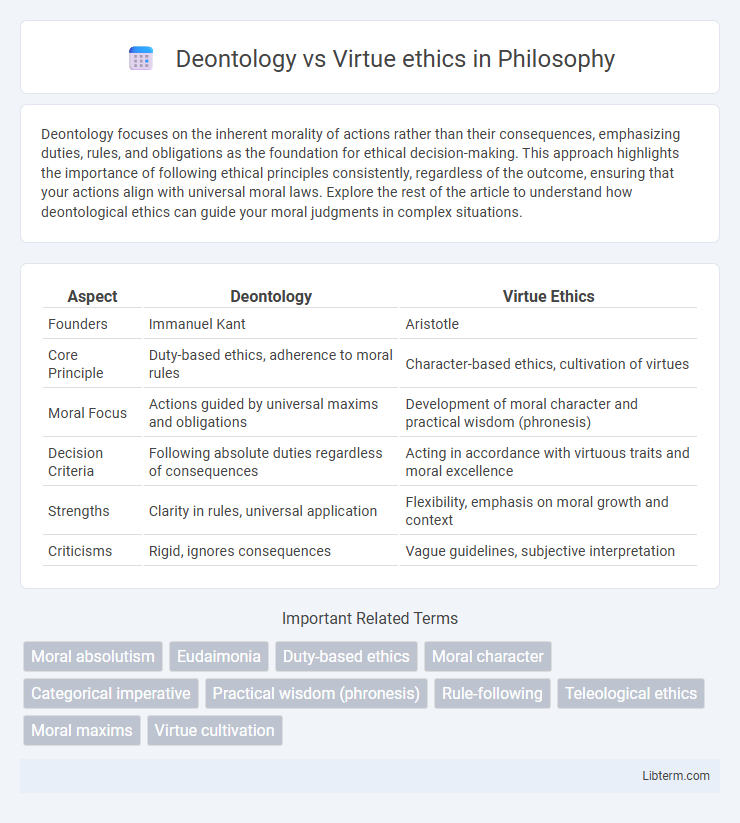Deontology focuses on the inherent morality of actions rather than their consequences, emphasizing duties, rules, and obligations as the foundation for ethical decision-making. This approach highlights the importance of following ethical principles consistently, regardless of the outcome, ensuring that your actions align with universal moral laws. Explore the rest of the article to understand how deontological ethics can guide your moral judgments in complex situations.
Table of Comparison
| Aspect | Deontology | Virtue Ethics |
|---|---|---|
| Founders | Immanuel Kant | Aristotle |
| Core Principle | Duty-based ethics, adherence to moral rules | Character-based ethics, cultivation of virtues |
| Moral Focus | Actions guided by universal maxims and obligations | Development of moral character and practical wisdom (phronesis) |
| Decision Criteria | Following absolute duties regardless of consequences | Acting in accordance with virtuous traits and moral excellence |
| Strengths | Clarity in rules, universal application | Flexibility, emphasis on moral growth and context |
| Criticisms | Rigid, ignores consequences | Vague guidelines, subjective interpretation |
Introduction to Deontology and Virtue Ethics
Deontology emphasizes the importance of duty and rules in ethical decision-making, asserting that actions are morally right if they adhere to established laws or obligations regardless of outcomes. Virtue ethics centers on character development and the cultivation of moral virtues, guiding individuals to act according to traits like courage, honesty, and compassion. Both frameworks address morality from different angles: deontology prioritizes adherence to moral duties, while virtue ethics stresses the formation of moral character.
Historical Origins and Philosophical Foundations
Deontology traces its historical origins to Immanuel Kant's 18th-century philosophy, emphasizing duties and moral rules grounded in reason and universal maxims. Virtue ethics, rooted in ancient Greek philosophy, particularly Aristotle's Nicomachean Ethics, focuses on character development and the cultivation of virtues to achieve eudaimonia, or human flourishing. Both frameworks offer distinct philosophical foundations: deontology centers on adherence to moral laws, while virtue ethics prioritizes moral character and practical wisdom.
Core Principles of Deontology
Deontology centers on adherence to moral duties and rules, emphasizing actions driven by obligation rather than consequences. Its core principles include universality, where moral rules apply consistently to all individuals, and respect for persons, treating individuals as ends in themselves rather than means. Immanuel Kant's categorical imperative exemplifies deontological ethics by mandating actions that can be universally willed.
Key Tenets of Virtue Ethics
Virtue ethics emphasizes character development and the cultivation of moral virtues such as courage, honesty, and compassion, rather than strict adherence to rules or consequences. It prioritizes practical wisdom (phronesis) to navigate complex moral situations by embodying virtues that lead to human flourishing (eudaimonia). Unlike deontology's focus on duties or rules, virtue ethics centers on becoming a virtuous person through habitual practice and moral exemplars.
Moral Decision-Making: Rules vs. Character
Deontology emphasizes moral decision-making based on adherence to explicit rules and duties, prioritizing actions that align with universal ethical principles regardless of consequences. Virtue ethics centers on the character traits and moral virtues of the individual, advocating for decisions that reflect wisdom, courage, and integrity cultivated over time. This contrast highlights rule-based compliance versus character-driven judgment as foundational approaches to ethical behavior.
Strengths of Deontological Ethics
Deontological ethics offers a clear framework for moral decision-making by emphasizing adherence to universal rules and duties, ensuring consistency and fairness in ethical judgments. Its strength lies in its ability to provide objective standards that do not fluctuate based on individual emotions or outcomes, making it highly reliable in maintaining social order and justice. The theory's emphasis on the intrinsic morality of actions supports accountability and respect for human rights, distinguishing it from consequence-based approaches.
Strengths of Virtue Ethics
Virtue ethics excels in emphasizing character development and moral virtues as the foundation for ethical behavior, fostering personal growth and practical wisdom. It provides flexibility in complex situations by focusing on the moral agent's intentions and holistic well-being rather than rigid rules. This approach encourages the cultivation of traits like courage, honesty, and compassion, promoting ethical consistency across diverse contexts.
Criticisms and Limitations of Each Approach
Deontology faces criticism for its rigid rule-based framework that can lead to morally conflicting duties without clear resolution, often ignoring the nuances of individual circumstances. Virtue ethics is limited by its subjective emphasis on character traits, lacking precise guidance for specific moral dilemmas and varying significantly across cultures. Both approaches struggle to provide a comprehensive ethical solution when applied in complex, real-world contexts involving diverse values and competing interests.
Practical Applications and Modern Examples
Deontology emphasizes adherence to moral duties and rules, making it practical in professions like law and medicine where clear ethical guidelines govern decision-making. Virtue ethics centers on character development, influencing fields such as education and leadership by promoting qualities like honesty, courage, and empathy. Modern applications show deontological principles in data privacy regulations and virtue ethics in corporate social responsibility initiatives.
Conclusion: Comparing and Contrasting the Two Ethical Theories
Deontology emphasizes adherence to moral rules and duties, prioritizing the intrinsic rightness of actions regardless of outcomes, while Virtue ethics centers on the development of character traits and moral virtues to guide behavior. Both frameworks offer valuable perspectives: deontology provides clear, rule-based guidance, whereas Virtue ethics fosters moral growth and situational wisdom. Understanding their differences enhances ethical decision-making by balancing rule-following with character cultivation.
Deontology Infographic

 libterm.com
libterm.com